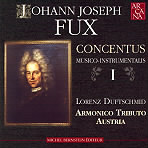Johann Joseph Fux was a contemporary of Bach, but his compositions owe more to the lyrical, Austrian-Italian musical tradition of Biber, Muffat, and Schmelzer than to the contrapuntal complexities of his North German colleagues. This is all the more remarkable when you consider that he was the author of the most revered counterpoint textbook (Gradus ad Parnassum, Vienna, 1725) in the history of Western music. Written in Latin in the form of a Socratic dialog, the book offered such a thorough and systematic course of self-study in the musical language of “Golden Age” composers such as Palestrina, and was so immediately successful, that it completely obliterated Fux’s reputation as a composer. In some ways this unfortunate turn of events was understandable, for his music is as simple, tuneful, and pleasing as his textbook is austere and intimidating. An encounter with Fux the composer must have come as a shock to his latter-day scholarly admirers, a musical revelation equivalent to the scene from The Wizard of Oz in which Toto pulls back the curtain to reveal the Wizard as a clever, grandfatherly old charlatan. The four suites on this recording–one a compilation of Fux’s exotic “Turkish” music from various sources–are simply delightful. They follow the typical Baroque pattern of an introductory Overture (or Fanfare, in one case), followed by a selection of characteristic arias and dances. Even better, this beautifully planned and vibrantly performed disc promises to be the first in a series. It’s high time we got to know the ingratiating “other side” of this fascinating, indeed legendary, musical figure.
































